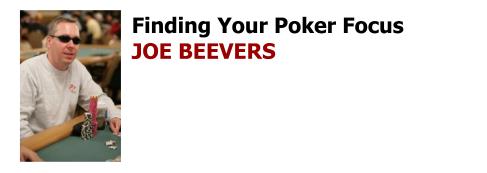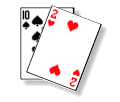
Have you ever found that you start some tournaments well, but in others you just can’t get “tuned in”? What should you do about it?
Let us consider a trained athlete just before he/she runs in the 100-meter final at the Olympics. What do they do? Are they in the bar having a beer or chatting with their friends in the crowd? Not usually. They’re typically going out of their way to block out all outside interferences. They may be sitting with their heads in their hands or standing with their heads bowed.
What do they think about? Winning. Having that gold medal placed around their necks.
How do they achieve the focus that everyone talks about? They probably mentally go through races that they’ve won. They pump themselves up by recalling past victories in their minds.
Let’s apply this to poker.
First though, go through all the hands that you’ve played badly (this will take some people longer than others). Think about hands that you’ve played that have knocked you out of tournaments at crucial stages. The time that you played A-Q (or even that lousy A-J) against a good player’s pre-flop raise, hit the Ace on the flop and then decimated your chip stack. The time that you called a raise for all your chips with pocket sevens or the time that you made an early position raise with pocket nines, fell in love with them and refused to pass for a re-raise on your left.
Now that that’s out of the way, think about hands you’ve played well: The perfect reads that you’ve put on opponents because everything seemed so transparent, the final tables that you’ve made and the tournaments that you’ve won. Can you remember the way you played through those victories, how quickly the time seemed to pass, and how confident you felt? This is how you can gain the “poker focus” that you need and slip straight into your “A” game at the start of the next tournament that you play.
Mike Caro once said that when you join a poker game, you should say to yourself, “I am a great poker player; a powerful winning force surrounds me.” I believe it’s a technique worth trying.
In the Great British Poker Tour Grand Final in Bristol back in December 2007, I found myself up against several really good players at the TV final table. Roland de Wolfe and Barny Boatman were both there, as well as Neil Channing and “Bambos” Xanthos. It was a while since I had won an event and I wanted that feeling back.
I tried to remember which victories had felt the best, and the one that came to mind was winning the Irish Open. I took myself back to that table in Dublin and before long found that I was playing with renewed confidence and using all my strengths to my best advantage. You know what’s kind of funny as well: When you get into that zone, you kind of seem luckier. That’s what players mean when they talk about making your own luck!
Joe Beevers
Nicknamed “The Elegance”, Joe Beevers is a member of The Hendon Mob. If you want to learn more about Joe, join him at the table online at bet365 Poker.
Here’s the latest player review of bet365 Poker in case you’re interested 🙂
 Some say you shouldn’t ever gamble unless you have the best of it. But most of the really successful gamblers I’ve ever met sometimes are willing to wager when they’re not sure they have an edge.
Some say you shouldn’t ever gamble unless you have the best of it. But most of the really successful gamblers I’ve ever met sometimes are willing to wager when they’re not sure they have an edge.![]() More poker tips and advice, including video tutorials can be found online – free – at bet365 Poker (Sorry, no USA Players – check out Compare Best Poker sites for US Players).
More poker tips and advice, including video tutorials can be found online – free – at bet365 Poker (Sorry, no USA Players – check out Compare Best Poker sites for US Players). Here’s one of my favorite hold ’em plays that you can use quite often without opponents adapting.
Here’s one of my favorite hold ’em plays that you can use quite often without opponents adapting. Against very weak opponents, it’s usually not necessary to randomize your decisions. You don’t need to be very deceptive, because a straightforward strategy will usually earn the most money. But against more experienced players it’s a good idea to mix it up, as long as you don’t sacrifice too much in the process.
Against very weak opponents, it’s usually not necessary to randomize your decisions. You don’t need to be very deceptive, because a straightforward strategy will usually earn the most money. But against more experienced players it’s a good idea to mix it up, as long as you don’t sacrifice too much in the process. When you’re down to your last few chips and can play for just the cost of the ante or blind, you should often wait to rebuy until after the hand! That’s because there are no better pot odds you than to be able to see the showdown for free with everyone else at the table matching your money with their antes.
When you’re down to your last few chips and can play for just the cost of the ante or blind, you should often wait to rebuy until after the hand! That’s because there are no better pot odds you than to be able to see the showdown for free with everyone else at the table matching your money with their antes.
 With all but the most powerful of hands, you always can justify just calling, rather than raising, when you’re in a blind position. Remember that you will be in poor position throughout future rounds of betting (except if you’re the big blind against only the small blind). This gives you less of an advantage than it may seem, and makes a raise questionable.
With all but the most powerful of hands, you always can justify just calling, rather than raising, when you’re in a blind position. Remember that you will be in poor position throughout future rounds of betting (except if you’re the big blind against only the small blind). This gives you less of an advantage than it may seem, and makes a raise questionable. The Difference Between Aces And Kings In Hold’em
The Difference Between Aces And Kings In Hold’em